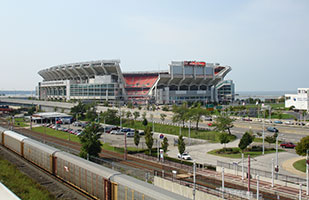Cleveland Method of Taxing Pro Athletes Unconstitutional

The Ohio Supreme Court today struck down Cleveland’s method for taxing NFL athletes who visit the city to play the Browns.

The Ohio Supreme Court today struck down Cleveland’s method for taxing NFL athletes who visit the city to play the Browns.
The Ohio Supreme Court today ruled that the way Cleveland calculates income taxes due from non-resident NFL players based on the number of games they play is unconstitutional because it violates their due process rights.
Cleveland taxes income earned in the city at 2 percent. For visiting professional athletes, Cleveland uses a “games-played” method in which the number of games played in Cleveland is divided by the total number of games in the season to find the amount of the athlete’s income to tax. All other cities that tax visiting players use the “duty-days” approach, in which the compensation to be taxed is calculated by dividing the number of days spent in a city by the total days worked during the year.
In a unanimous decision written by Justice Judith Ann Lanzinger, the court concluded that Cleveland’s games-played method improperly reaches income earned from work done outside the city.
The court held that Hunter T. Hillenmeyer, a former linebacker for the Chicago Bears, is entitled to a partial refund of taxes paid to Cleveland for 2004, 2005, and 2006. The court instructed that tax refunds be awarded to Hillenmeyer based on his duty-days calculation, plus interest as appropriate. Although other methods of computing local taxes may meet due process requirements, Cleveland did not suggest an alternative approach, the court noted.
The court also released a decision today in another appeal from a former NFL player, who was taxed by Cleveland even though he stayed in Indianapolis for treatment for an injury.
Case Replay
Hillenmeyer filed for refunds of taxes he paid to Cleveland from 2004 to 2006. In January 2008, the city’s tax authority denied his requests. Hillenmeyer appealed to the city’s board of review and the state’s Board of Tax Appeals, which both rejected his claims.
According to testimony in his case, NFL player contracts require athletes to attend training camps, meetings, practices, game preparation, and games from the preseason through the regular season and into the postseason if the team makes it that far.
Under Cleveland’s games-played calculation, a visiting NFL player who plays one game in Cleveland out of 20 would pay the city’s 2-percent tax rate on 5 percent of his income. Hillenmeyer claimed that this method overstated his taxes, because overall he worked 154 days in 2004, 165 in 2005, and 168 in 2006, and based on the duty-days method, he would have paid city taxes on only 1.27 of his income in 2004, 1.21 percent in 2005, and 1.19 percent in 2006.
Cleveland Overreaches
Justice Lanzinger noted that Cleveland’s ordinances, state law, and federal regulations do not mandate how to allocate wages across multiple jurisdictions when income is earned in several locations. Therefore, Cleveland’s method for calculating its taxes was not prohibited by local, state, or federal law.
However, the due process clause of the U.S. Constitution prohibits a tax authority from collecting taxes on a nonresident’s income earned outside its boundaries, Justice Lanzinger explained. She wrote that compensation must be divided among the places the employee worked.
“Due process requires an allocation that reasonably associates the amount of compensation taxed with work the taxpayer performed within the city,” she reasoned. “By using the games-played method, Cleveland has reached extraterritorially, beyond its power to tax. Cleveland’s power to tax reaches only that portion of a nonresident’s compensation that was earned by work performed in Cleveland. The games-played method reaches income for work that was performed outside of Cleveland, and thus Cleveland’s income tax violates due process as applied to NFL players such as Hillenmeyer.”
“[T]he duty-days method properly includes as taxable income only that compensation earned in Cleveland by accounting for all the work for which an NFL player such as Hillenmeyer is paid, rather than merely the football games he plays each year,” Justice Lanzinger continued. “This method therefore comports with due process and ensures that the tax collected is not disproportionate to the income received for work in Cleveland.”
Other Strategies Fail
The court rejected Hillenmeyer’s argument that a local law excluding entertainers and athletes from a tax exemption for nonresidents who work in Cleveland for fewer than 12 days violates equal protection. The court also determined it did not need to address a claim involving the federal constitution’s commerce clause.
2014-0235. Hillenmeyer v. Cleveland Bd. of Rev., Slip Opinion No. 2015-Ohio-1623.
 View oral argument video of this case.
View oral argument video of this case.
Please note: Opinion summaries are prepared by the Office of Public Information for the general public and news media. Opinion summaries are not prepared for every opinion, but only for noteworthy cases. Opinion summaries are not to be considered as official headnotes or syllabi of court opinions. The full text of this and other court opinions are available online.
Acrobat Reader is a trademark of Adobe Systems Incorporated.


